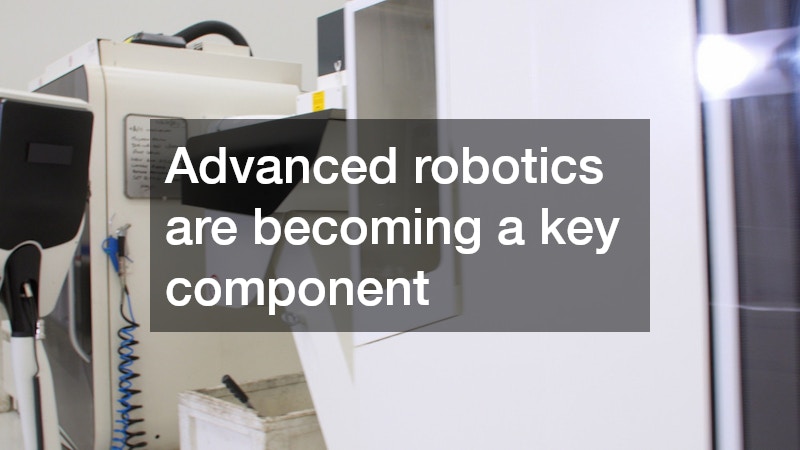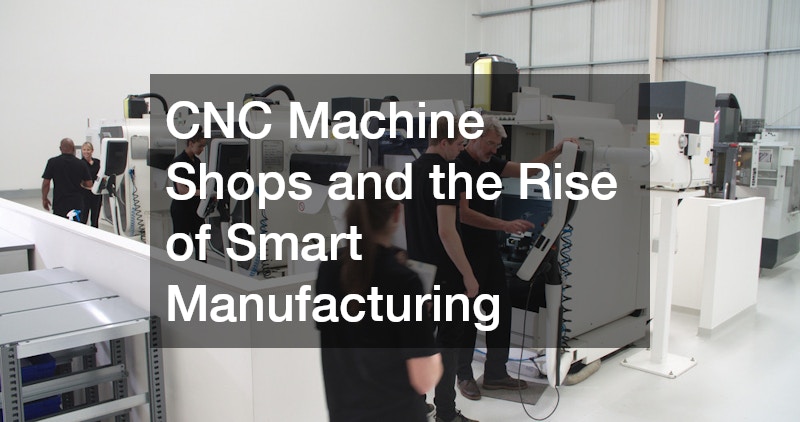Disclaimer: Info Tech. This site provides computers and technology news for informational purposes only.
The manufacturing industry has undergone a remarkable transformation over the past few decades. From traditional assembly lines to automated processes, technological advancements have continually reshaped how products are designed, produced, and delivered. One of the most significant changes in modern manufacturing is the integration of smart technologies, often referred to as Industry 4.0, which combines automation, data exchange, and advanced analytics. At the heart of this transformation are CNC machine shops, which have evolved from simple computer-controlled tool operations to highly sophisticated centers of precision manufacturing. Understanding how these shops are adapting to smart manufacturing is essential for businesses looking to stay competitive in today’s fast-paced industrial landscape.
The Evolution of CNC Machining
CNC, or Computer Numerical Control, refers to machines that are operated via computer programming to perform highly precise tasks such as cutting, drilling, and milling. Historically, CNC shops were valued primarily for their ability to produce consistent, repeatable components with minimal human intervention. While this automation was a significant step forward, it was only the beginning.
Today’s CNC machine shops are embracing smart manufacturing principles, leveraging IoT-enabled machines, real-time monitoring, and predictive analytics to optimize every stage of production. Sensors installed on machine tools can collect data on temperature, vibration, and tool wear, allowing operators to identify potential issues before they escalate into costly downtime. This integration of digital intelligence with traditional CNC operations is redefining what precision manufacturing can achieve.
Smart Manufacturing Technologies in CNC Shops
Several key technologies are driving the rise of smart manufacturing in CNC machine shops. The integration of IoT, or Internet of Things devices, allows machines to communicate with one another and with central monitoring systems. By connecting CNC equipment to a network, manufacturers can gain real-time insights into production efficiency, machine health, and material usage, enabling faster, data-driven decisions.
Artificial intelligence and machine learning are also transforming CNC operations. AI algorithms analyze historical production data to optimize cutting paths, reduce material waste, and predict maintenance needs. Machine learning models can even suggest adjustments to improve output quality based on previous performance, making operations smarter and more adaptive.
Digital twin technology further enhances efficiency by creating virtual representations of physical machines or processes. These digital twins allow operators to simulate machining operations, identify potential bottlenecks, and fine-tune production parameters without halting actual production, saving both time and resources.
Advanced robotics are becoming a key component as well. Collaborative robots, or cobots, work alongside CNC machines to handle material loading, part inspection, and assembly. By increasing efficiency and reducing the risk of human error, these robots help maintain high-quality standards while supporting safer work environments.
Through these technologies, CNC machine shops are able to operate with unprecedented precision and efficiency, paving the way for a truly smart manufacturing environment.
Benefits of Smart Manufacturing for CNC Operations
The integration of smart technologies offers several tangible benefits for CNC machine shops. First, predictive maintenance reduces unexpected downtime, which is crucial for operations that rely on high-volume, continuous production. Sensors detect early signs of wear or misalignment, allowing maintenance teams to intervene proactively rather than reactively.
Second, real-time monitoring and analytics provide insights that help manufacturers optimize processes. For example, data from CNC machines can reveal which operations are slowing production or consuming excessive energy. By addressing these inefficiencies, shops can save both time and money while maintaining consistent quality standards.
Third, smart manufacturing improves supply chain integration. Connected systems allow CNC shops to share production data with suppliers and customers, ensuring timely deliveries and reducing inventory waste. This level of visibility also enables more agile decision-making, which is increasingly important in a market where demand can fluctuate rapidly.
Challenges and Considerations
While the benefits are clear, adopting smart manufacturing in CNC machine shops comes with challenges. Implementing advanced technology requires significant upfront investment in both hardware and software. Additionally, employees must be trained to work with new systems, interpret data analytics, and maintain complex equipment.
Cybersecurity is another critical concern. As CNC machines become more connected, they also become potential targets for cyberattacks. Protecting sensitive design files, operational data, and production systems is essential for safeguarding both intellectual property and business continuity.
Despite these challenges, many manufacturers consider smart manufacturing an essential investment for long-term competitiveness. The ability to combine traditional machining expertise with advanced digital tools offers a pathway to higher efficiency, reduced costs, and superior product quality.
The Future of CNC Machining
The trajectory for CNC machine shops is closely tied to the evolution of smart manufacturing. As technology continues to advance, these shops will likely see even greater automation, integration, and predictive capabilities. Artificial intelligence could drive fully autonomous machining operations, while real-time cloud analytics might enable manufacturers to respond instantaneously to changes in demand or supply.
Moreover, sustainability is becoming a priority. Smart manufacturing enables CNC shops to reduce energy consumption, minimize waste, and make more environmentally responsible choices. By combining precision machining with data-driven decision-making, the industry is moving toward a more efficient and sustainable future.
The rise of smart manufacturing represents a significant shift for CNC shops, transforming them from traditional machining centers into digitally integrated, data-driven operations. By embracing technologies like IoT, AI, digital twins, and robotics, these shops are improving efficiency, reducing downtime, and enhancing product quality. While implementation requires investment and careful planning, the long-term benefits make smart manufacturing a crucial strategy for staying competitive in the modern industrial landscape.
As manufacturing continues to evolve, CNC machine shops that adapt to these changes will not only survive but thrive, positioning themselves at the forefront of innovation and precision in an increasingly connected world.

